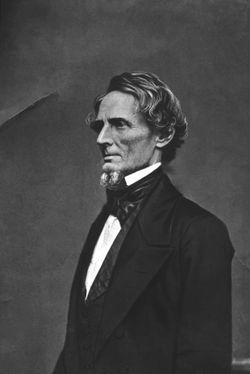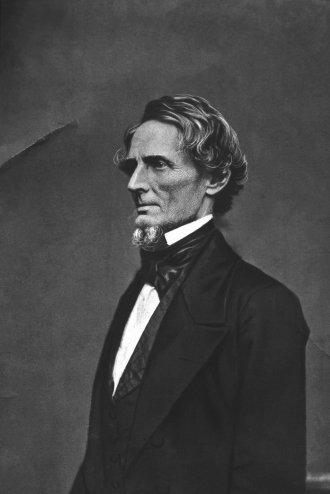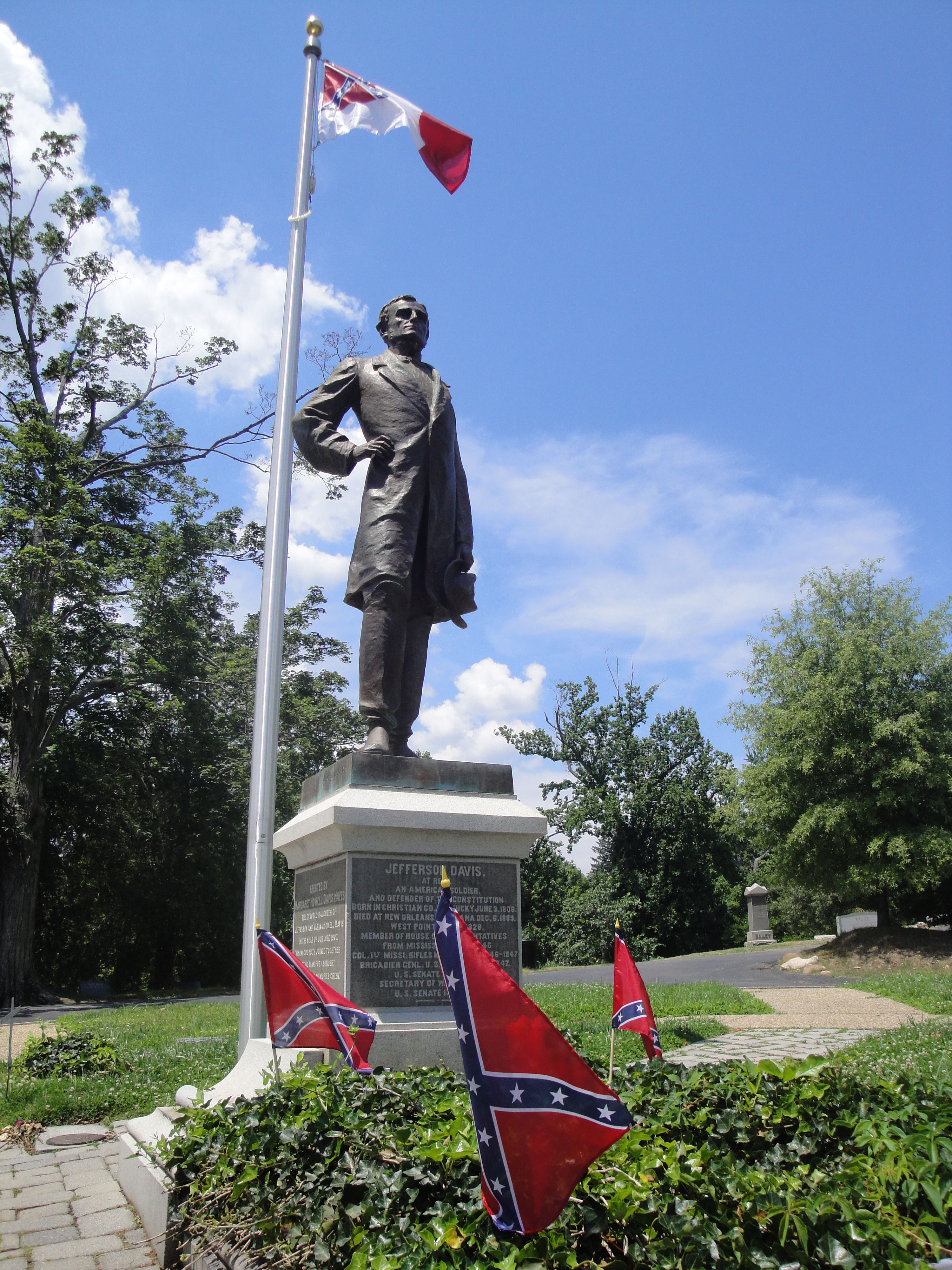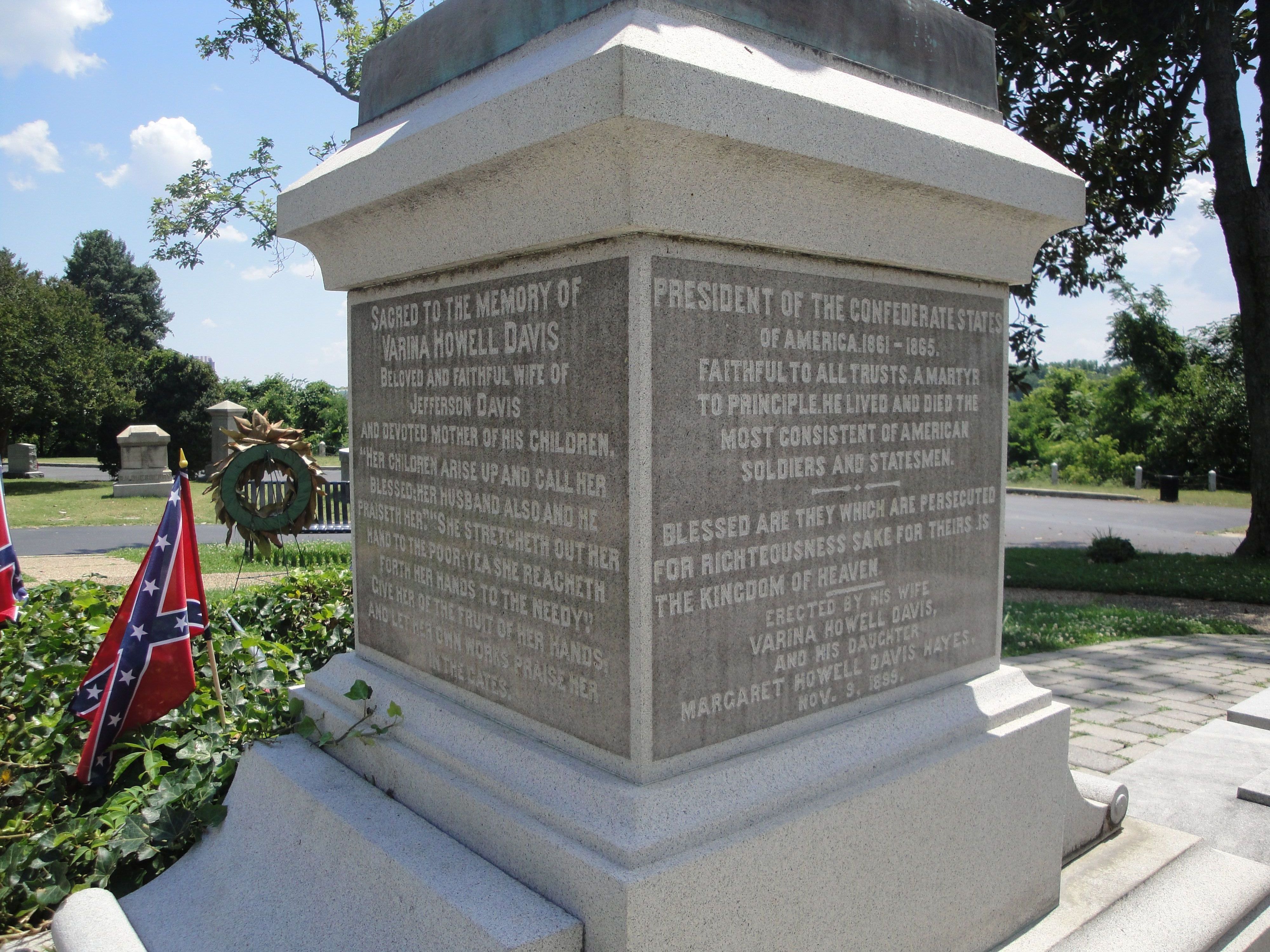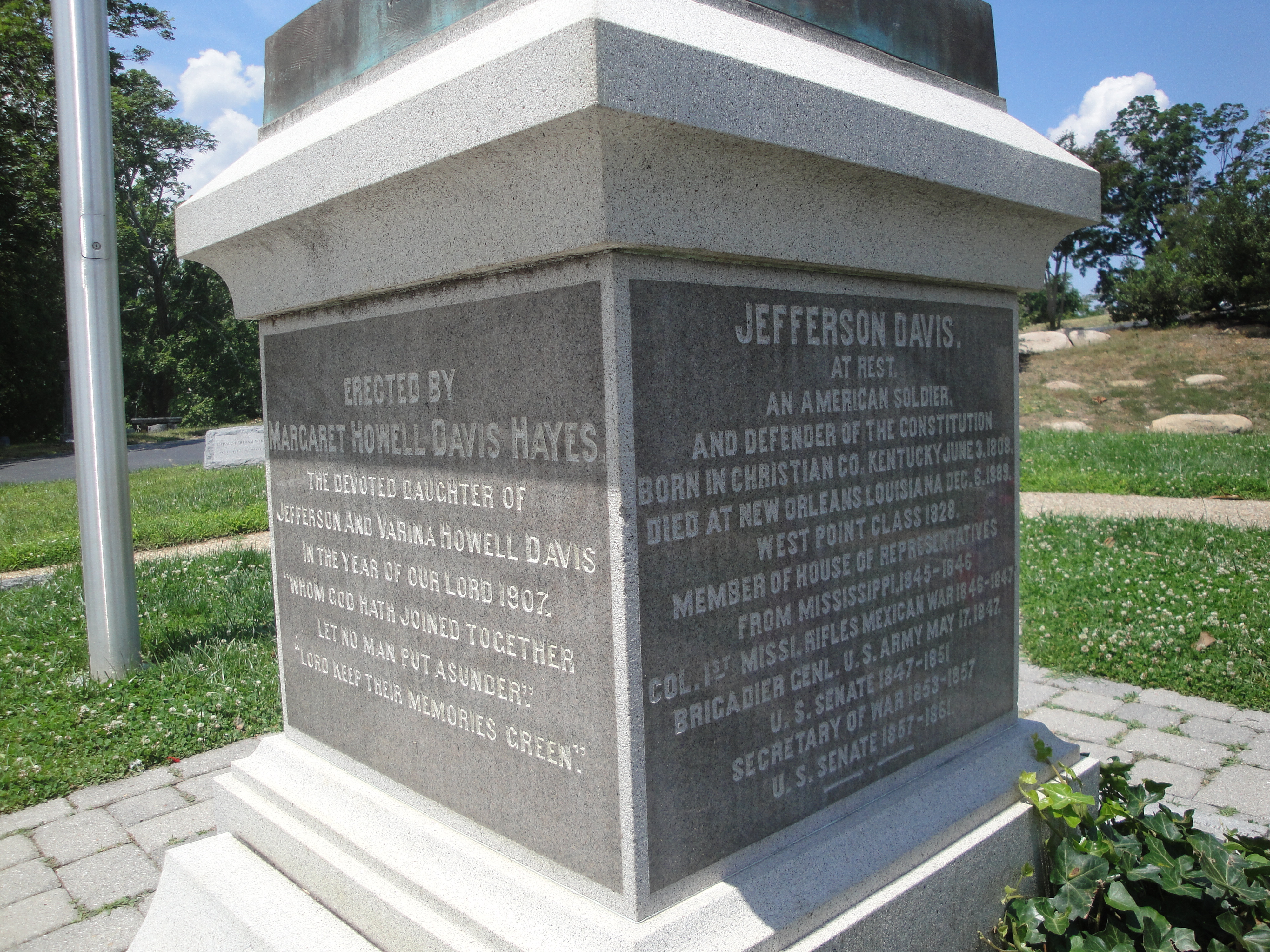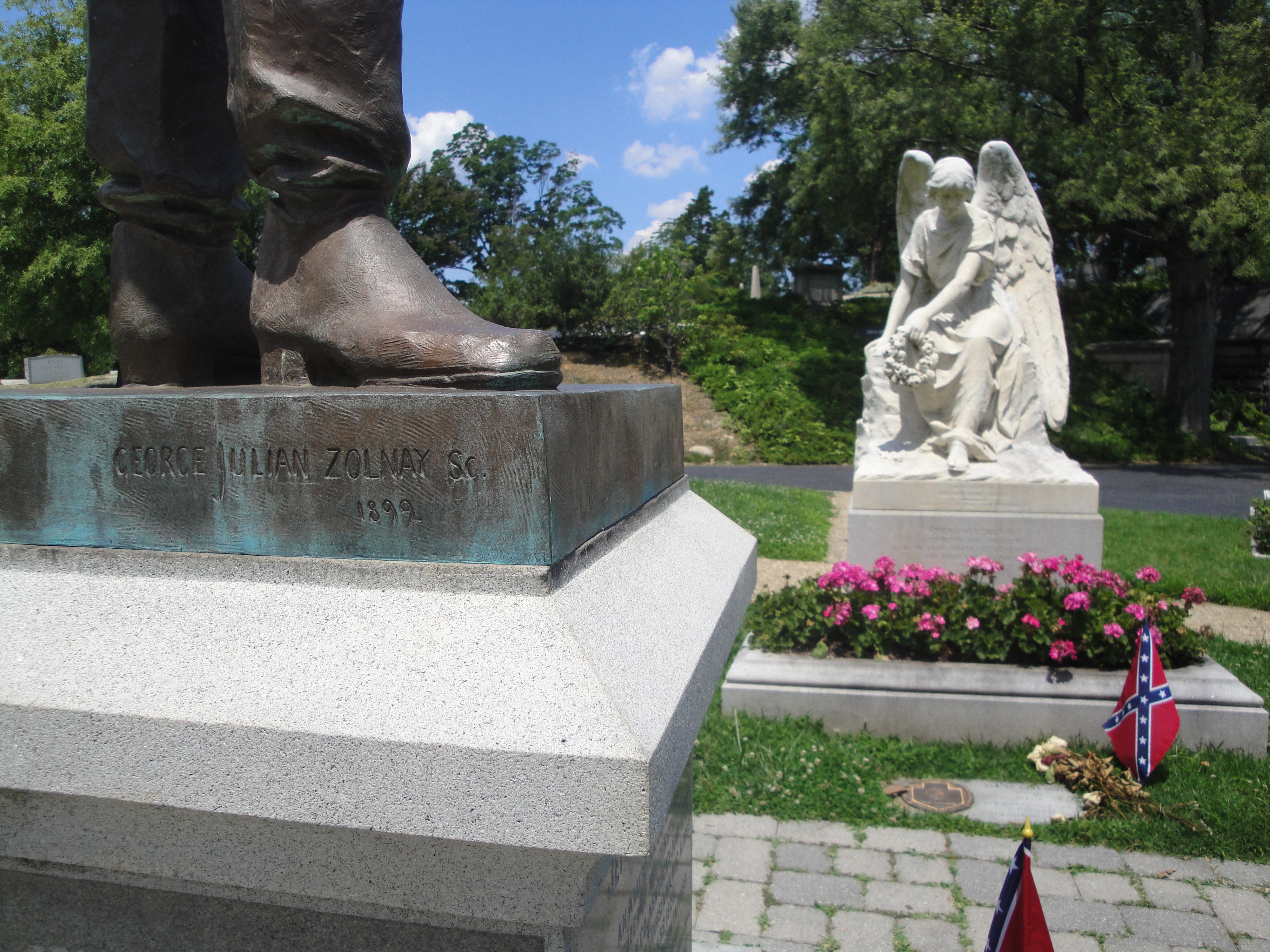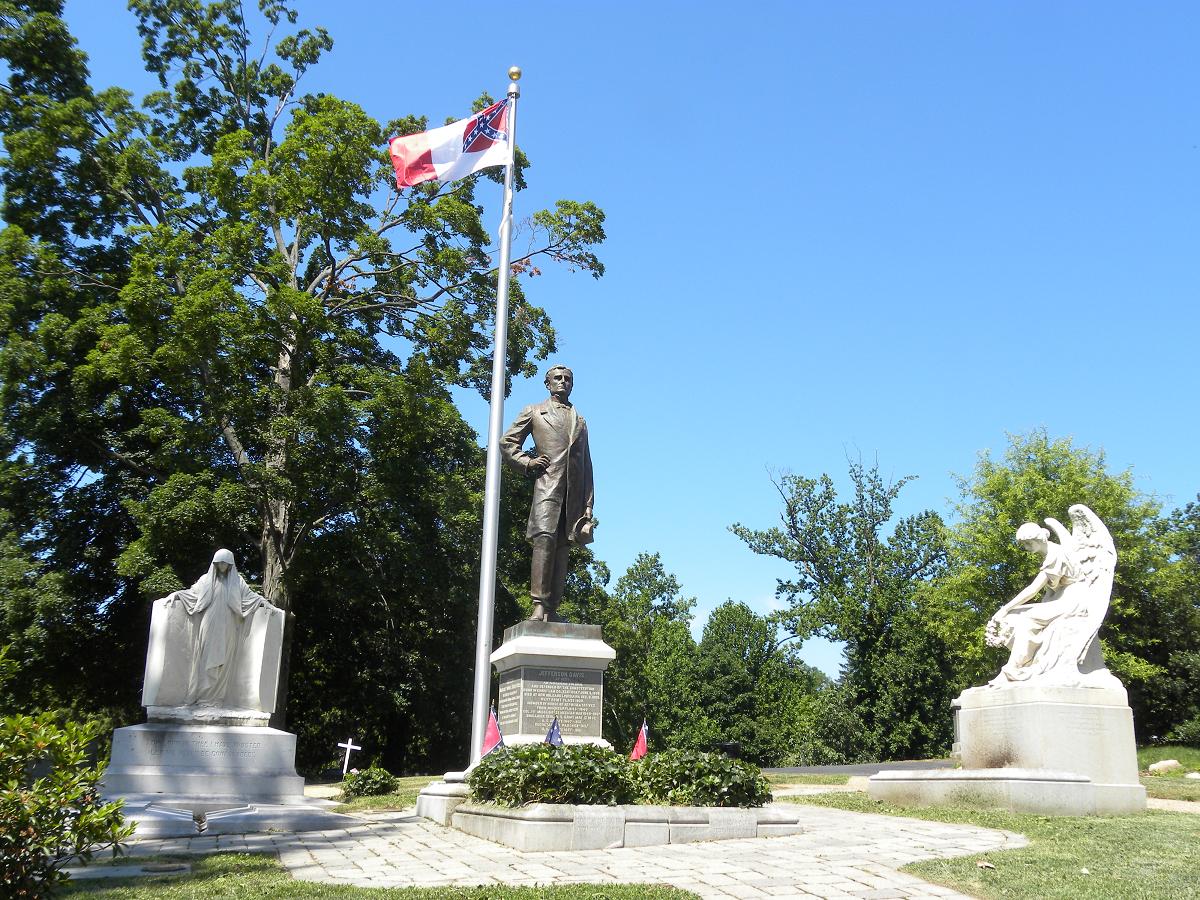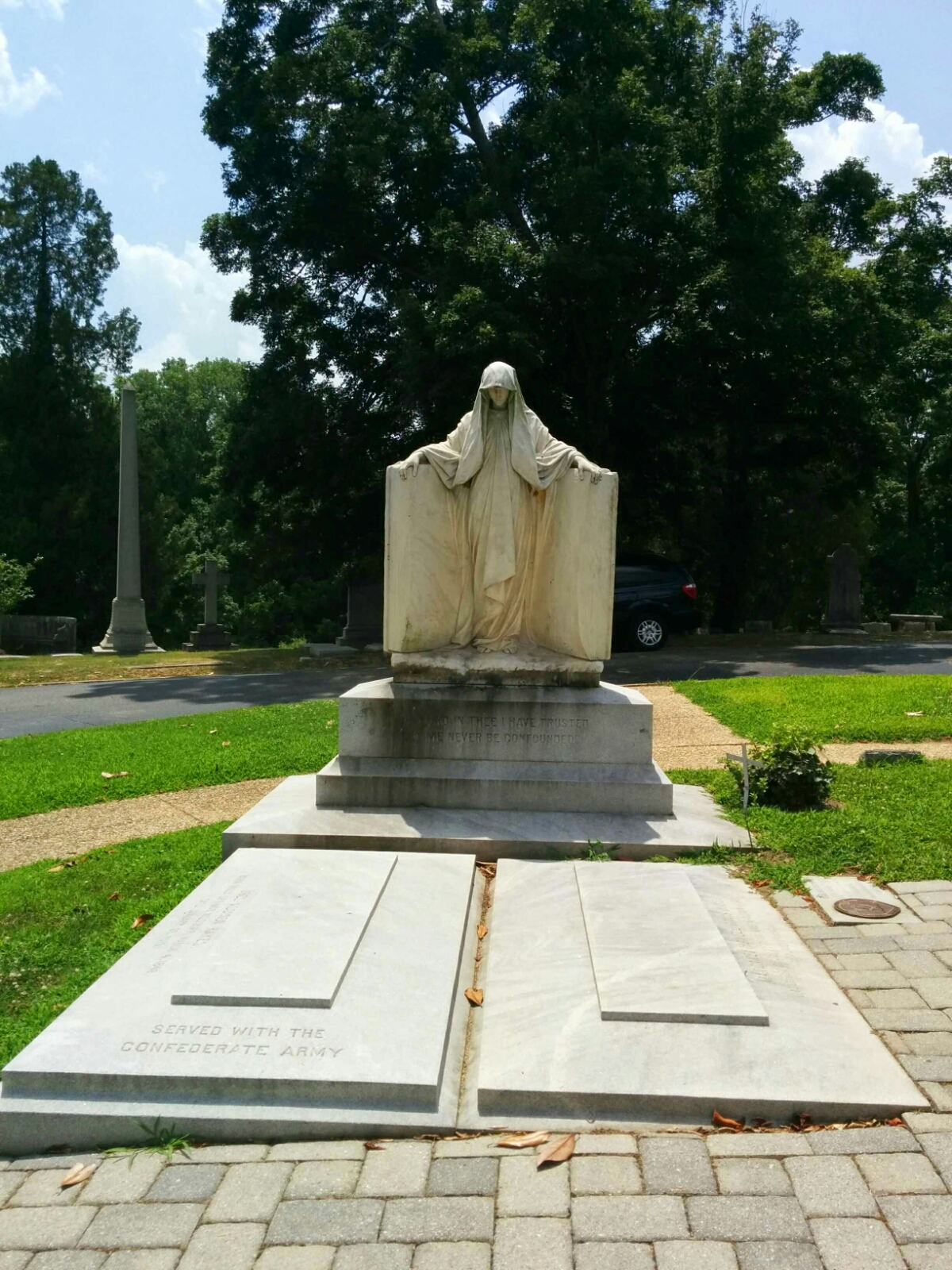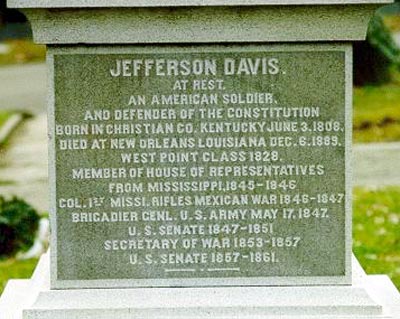Confederate States of America President, Author. Jefferson Davis was the unrepentant highest ranking Confederate leader during the American Civil War, and after the war, the only Confederate leader shackled in a dungeon and sacrificed as atonement for the crimes of many. He refused to apply for a pardon because, he said, "I have not repented." In 1978, the United States Congress posthumously restored Davis's United States citizenship. After his death of pneumonia occurred while visiting New Orleans, he was the symbol of the "Lost Cause" and the most revered man in the South for many years. Eighteen months after his death and burial in Metaire Cemetery in New Orleans, Davis's widow, Varina, decided the final burial place was to be Richmond's Hollywood Cemetery considered the National Cemetery of the Confederacy. His remains, were removed from the vault in New Orleans and placed on a Confederate flag-draped caisson escorted by honor guards composed of his old soldiers to Memorial Hall, where he lay in state. The next day, as thousands of people silently watched from the sidewalks and balconies, the caisson bore his body to a waiting funeral train. On the way, bonfires beside the tracks lit up ranks of Davis's old soldiers standing at attention beside stacked arms. In Richmond, gray-haired veterans escorted him to the Virginia statehouse where thousands filed past in respect before interment. After his family came to Mississippi when he was three years old, he became a planter as was his father and brother. In 1835 he married Sarah Knox "Knoxie" Taylor, the daughter of the 12th U.S. president Zachary Taylor, but his wife died six months after the marriage from a fever. As a widower in 1838. he purchased Brierfield Plantation and eventually had 113 enslaved working the plantation. In 1845, he married Varina Anne Banks Howell, who became the First Lady of the Confederacy. The couple had four sons and two daughters. All their sons died before age 20 and only one daughter married. Before the start of the American Civil War on April 12, 1861, he had years of political service in Washington, which propelled him into leadership as President of the Confederacy. Politically, he was a vocal proponent of States Rights. Representing the State of Mississippi, he served in both houses of the U.S. Congress: As a Representative for one year starting in 1845 before resigning to fight in the Mexican War, and as a Senator for one year starting 1847 before resigning to be an unsuccessful candidate for governor of Mississippi and serving again from 1857 to the start of the American Civil War. In 1853 he was appointed as United States Secretary of War during the administration of Franklin Pierce until 1857. His military career was both extensive and honorable starting with a completed four-year term as a West Point cadet, graduating twenty-third in a class of thirty-four. During the Mexican-American War, Davis served as a colonel, raised a volunteer regiment which saw extensive service in Mexico where he was wounded. His leadership of the Confederacy during the American Civil War was full with doubtful decisions. In the four years of the war, his cabinet had four Secretaries of State, three Treasurers, five Secretaries of War, and five Attorney Generals. The Confederacy did not have the funds to finance a four-year war. All of this was instrumental in leading to the loss of the war and allowing the war to continue when all was lost. Finally, General Robert Lee ended the bloodshed with a surrender at Appomattox on April 9, 1865. Rather than surrendering to Union forces, he fled Richmond aboard a train with his cabinet to Georgia with the remaining gold from the treasury in an attempt to prolong the conflict. On May 10, 1865, Davis was captured at Irwinville, Georgia without a fight and placed under arrest. Union officials were in a quandary as to his fate. He was confined to an open unheated artillery gun emplacement in the ramparts of Fortress Monroe in Virginia under deplorable condition. Although under indictment for treason, he was released after two years in poor health. The federal government dismissed charges because of constitutional concerns. However, he was stripped of his citizenship and his remaining property confiscated, making him poverty-stricken with a family with young children. He attempted with investors to start an insurance company but without success. Still defiant, he presided over a memorial service in Richmond for Robert E. Lee upon his death. Davis was elected to the U.S. Senate but could not serve because of loss of citizenship. He spent his last twelve years in retirement at his Beauvoir Estate located between Biloxi and Gulfport, Mississippi. He turned to the pen and wrote the two-volume book, "The Rise and Fall of the Confederate Government" and then only two months before his death in New Orleans at age eighty-one completed "A Short History of the Confederate States of America." There were several memorials erected to honor him: Jefferson Davis Memorial Historic Site located at the site of his capture in Irwin County, Georgia; his birthplace is the Jefferson Davis Monument State Historic Site in a Kentucky State Park; a full statue of was erected on campus at the University of Texas, but was removed in 2015 to a museum, a statue in Nashville, Tennessee was removed in 2017, and the memorial in New Orleans at the site of his death was removed in 2017. His horse, Traveler, was his special pet and companion during the last years of his life.
Confederate States of America President, Author. Jefferson Davis was the unrepentant highest ranking Confederate leader during the American Civil War, and after the war, the only Confederate leader shackled in a dungeon and sacrificed as atonement for the crimes of many. He refused to apply for a pardon because, he said, "I have not repented." In 1978, the United States Congress posthumously restored Davis's United States citizenship. After his death of pneumonia occurred while visiting New Orleans, he was the symbol of the "Lost Cause" and the most revered man in the South for many years. Eighteen months after his death and burial in Metaire Cemetery in New Orleans, Davis's widow, Varina, decided the final burial place was to be Richmond's Hollywood Cemetery considered the National Cemetery of the Confederacy. His remains, were removed from the vault in New Orleans and placed on a Confederate flag-draped caisson escorted by honor guards composed of his old soldiers to Memorial Hall, where he lay in state. The next day, as thousands of people silently watched from the sidewalks and balconies, the caisson bore his body to a waiting funeral train. On the way, bonfires beside the tracks lit up ranks of Davis's old soldiers standing at attention beside stacked arms. In Richmond, gray-haired veterans escorted him to the Virginia statehouse where thousands filed past in respect before interment. After his family came to Mississippi when he was three years old, he became a planter as was his father and brother. In 1835 he married Sarah Knox "Knoxie" Taylor, the daughter of the 12th U.S. president Zachary Taylor, but his wife died six months after the marriage from a fever. As a widower in 1838. he purchased Brierfield Plantation and eventually had 113 enslaved working the plantation. In 1845, he married Varina Anne Banks Howell, who became the First Lady of the Confederacy. The couple had four sons and two daughters. All their sons died before age 20 and only one daughter married. Before the start of the American Civil War on April 12, 1861, he had years of political service in Washington, which propelled him into leadership as President of the Confederacy. Politically, he was a vocal proponent of States Rights. Representing the State of Mississippi, he served in both houses of the U.S. Congress: As a Representative for one year starting in 1845 before resigning to fight in the Mexican War, and as a Senator for one year starting 1847 before resigning to be an unsuccessful candidate for governor of Mississippi and serving again from 1857 to the start of the American Civil War. In 1853 he was appointed as United States Secretary of War during the administration of Franklin Pierce until 1857. His military career was both extensive and honorable starting with a completed four-year term as a West Point cadet, graduating twenty-third in a class of thirty-four. During the Mexican-American War, Davis served as a colonel, raised a volunteer regiment which saw extensive service in Mexico where he was wounded. His leadership of the Confederacy during the American Civil War was full with doubtful decisions. In the four years of the war, his cabinet had four Secretaries of State, three Treasurers, five Secretaries of War, and five Attorney Generals. The Confederacy did not have the funds to finance a four-year war. All of this was instrumental in leading to the loss of the war and allowing the war to continue when all was lost. Finally, General Robert Lee ended the bloodshed with a surrender at Appomattox on April 9, 1865. Rather than surrendering to Union forces, he fled Richmond aboard a train with his cabinet to Georgia with the remaining gold from the treasury in an attempt to prolong the conflict. On May 10, 1865, Davis was captured at Irwinville, Georgia without a fight and placed under arrest. Union officials were in a quandary as to his fate. He was confined to an open unheated artillery gun emplacement in the ramparts of Fortress Monroe in Virginia under deplorable condition. Although under indictment for treason, he was released after two years in poor health. The federal government dismissed charges because of constitutional concerns. However, he was stripped of his citizenship and his remaining property confiscated, making him poverty-stricken with a family with young children. He attempted with investors to start an insurance company but without success. Still defiant, he presided over a memorial service in Richmond for Robert E. Lee upon his death. Davis was elected to the U.S. Senate but could not serve because of loss of citizenship. He spent his last twelve years in retirement at his Beauvoir Estate located between Biloxi and Gulfport, Mississippi. He turned to the pen and wrote the two-volume book, "The Rise and Fall of the Confederate Government" and then only two months before his death in New Orleans at age eighty-one completed "A Short History of the Confederate States of America." There were several memorials erected to honor him: Jefferson Davis Memorial Historic Site located at the site of his capture in Irwin County, Georgia; his birthplace is the Jefferson Davis Monument State Historic Site in a Kentucky State Park; a full statue of was erected on campus at the University of Texas, but was removed in 2015 to a museum, a statue in Nashville, Tennessee was removed in 2017, and the memorial in New Orleans at the site of his death was removed in 2017. His horse, Traveler, was his special pet and companion during the last years of his life.
Bio by: Donald Greyfield
Gravesite Details
Eighteen months after being buried in Metaire Cemetery in New Orleans, his widow had his body the disinterred and relocated to Hollywood Cemetery in Richmond, Virginia.
Family Members
Other Records
Advertisement
See more Davis memorials in:
Records on Ancestry
Sponsored by Ancestry
Advertisement
